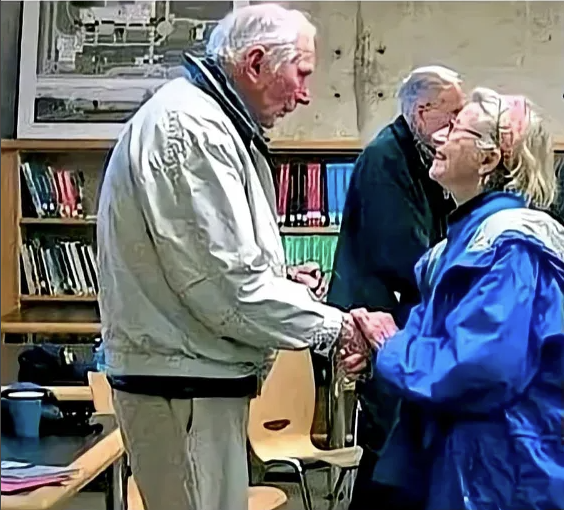
At my son’s high school, two WWII veterans spoke—Thomas Berg from Pearl Harbor and Thomas MacElwee from D-Day. During the Q&A, an elderly woman with a foreign accent stood up.
“I was there,” she said. “I was in the Netherlands. They slipped a note under our door saying you were coming to save us. And you DID.”
Her voice broke as she thanked them 75 years later. The room fell silent, and I broke down crying for all the young boys who died, grateful my son witnessed history come alive.
High school assembly. Two WWII veterans speaking to students who were born 70+ years after the war ended. Thomas Berg from Pearl Harbor—December 7, 1941, “a date which will live in infamy,” when Japanese forces attacked and America entered the war. Thomas MacElwee from D-Day—June 6, 1944, when Allied forces stormed Normandy beaches in the largest amphibious invasion in history.
These two men, now elderly, carrying memories of events that shaped the 20th century, speaking to teenagers for whom WWII is ancient history. Trying to make real something that students know only from textbooks and movies. Answering questions, sharing stories, keeping history alive while they still can.
During the Q&A, an elderly woman with a foreign accent stood up. Not a veteran. Not American originally. But someone with her own WWII story to tell.
“I was there. I was in the Netherlands.” The Netherlands was occupied by Nazi Germany from 1940-1945. Five years of oppression, persecution, starvation (particularly during the “Hunger Winter” of 1944-45), deportation of Jews, resistance and collaboration, living under enemy occupation while hoping for liberation.
“They slipped a note under our door saying you were coming to save us.” Picture that moment. The Netherlands still occupied, German forces still present, but Allied forces advancing. Someone—Resistance fighters, probably—risking their lives to spread hope, slipping notes under doors: The Allies are coming. Liberation is near. Hold on.
“And you DID.” Those three words carry immeasurable weight. Because many people who received notes saying “we’re coming to save you” didn’t survive to see liberation. Many died in those final months of occupation. But this woman did. She survived. And the note was true—the Allies came, liberated the Netherlands, ended five years of occupation.
“Her voice broke as she thanked them 75 years later.” Seventy-five years. She’d lived an entire lifetime—raised family, built career, grew old—carrying the memory of that moment when Allied soldiers liberated her country. And here, in a high school auditorium, she finally got to thank two of them in person. Her voice broke because that gratitude had been waiting 75 years to be expressed directly to the men who saved her.
“The room fell silent, and I broke down crying for all the young boys who died.” Because that’s what WWII was—young boys, many not much older than the high school students in that auditorium, dying on beaches and in foxholes and aboard ships. They didn’t all survive to become elderly veterans sharing stories. Many never came home. And this woman’s gratitude honors both those who survived and those who didn’t.
“Grateful my son witnessed history come alive.” Because reading about WWII in textbooks is one thing. Hearing elderly veterans share memories is another. But watching a woman who lived through Nazi occupation thank her liberators 75 years later—that’s history coming alive. That’s understanding viscerally what war meant, what liberation meant, why it mattered.
The photo shows the woman greeting one of the veterans, both elderly now, both sharing this profound moment. You can see the emotion, the connection between liberator and liberated, the completion of a story that began 75 years ago with a note slipped under a door in occupied Netherlands.
This story matters because WWII veterans are dying. Soon, there will be none left to share firsthand memories. Same for Holocaust survivors, for people who lived through the war. These students got to witness something irreplaceable—direct testimony from people who lived history rather than just studied it.
It reminds us that military service has concrete human impact. These weren’t abstract geopolitical conflicts. They were young American boys liberating occupied countries, saving people like this Dutch woman who waited 75 years to say thank you in person.
And it shows how gratitude endures. The woman could have stayed silent, let the veterans speak and students ask questions. But she stood up, voice breaking, to say what she’d carried for 75 years: You came to save us. And you did. Thank you.
The young boys who died never got to hear that gratitude. But Thomas Berg and Thomas MacElwee did. In a high school auditorium, 75 years after the war, they heard from someone they saved: I was there. You liberated us. Thank you.